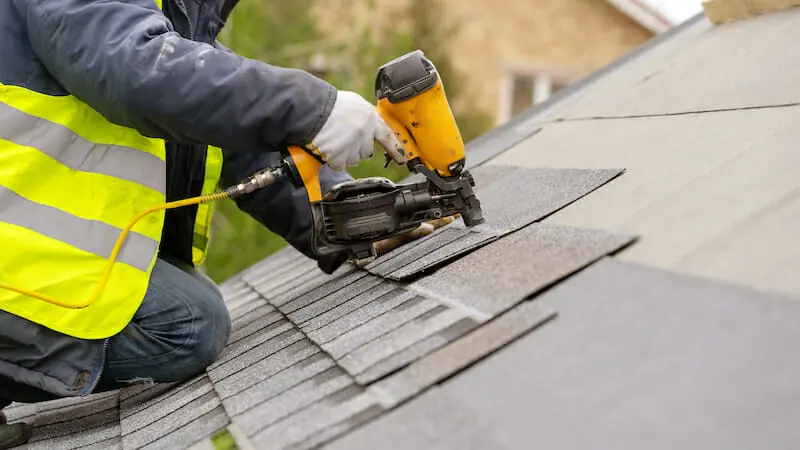Does Insurance Cover Commercial Roof Repair?
7 min read
Insurance can be a pretty confusing thing. It doesn’t matter if we’re talking about commercial insurance, homeowner’s insurance, car insurance, medical insurance, or any other type of insurance – there are always a lot of questions. One question that we hear a lot is whether or not insurance will cover commercial roof repair.
It’s a valid question, especially if you’re someone that has buildings covered by insurance. You’d definitely want to know if you’d be covered in the event that something happened to your roof and you needed repairs.
Today, we’re going to be taking a look at this question and, hopefully, be able to come to an easy-to-digest answer. So, if you’re wondering whether or not your insurance policy will cover commercial roof repair, read on!
How Does Insurance Work?
Before we can figure out if commercial roof repair is covered by insurance, we need to understand how insurance works. Essentially, insurance is a contract between you and an insurer.
You pay premiums (usually on a monthly or yearly basis) and, in exchange, the insurer agrees to provide financial protection in the event that something happens that is covered by your policy.
There are four main types of coverage that are typically included in an insurance policy:
- Property damage coverage:
- This type of coverage will protect you financially if your property is damaged in some way. For example, if your home is damaged by fire or windstorm, your property damage coverage would kick in.
- Liability Coverage:
- This type of coverage protects you financially if you’re sued for damages because of something that happened as a result of your negligence. For example, if someone slips and falls on your property and sues you for medical expenses, this type of coverage would help cover those costs.
- Medical Payments Coverage:
- This type of coverage pays for medical expenses incurred by someone who was injured on your property regardless of who was at fault.
- Personal Property Coverage:
- This type covers damages to personal belongings such as furniture or clothing caused by certain events like fire or theft.
It’s important to understand that insurance policies have limits. That means that there is a maximum amount of money that the insurer will pay out for any given claim. Once you reach that limit, you’re on your own financially.
It’s also important to understand that insurance policies have deductibles. A deductible is the amount of money that you have to pay out-of-pocket before your insurance policy will start paying for damages.
For example, let’s say you have a $500 deductible and you suffer $5,000 worth of damage to your home. You would be responsible for the first $500 and then your insurer would cover the remaining $4,500.
Deductibles can vary depending on the type of coverage and the insurer but they typically range from a few hundred dollars to a few thousand dollars. It’s important to choose an amount that you’re comfortable with because you’ll have to pay it if something happens and you make a claim under your policy.
Choosing a higher deductible usually results in lower premiums while choosing a lower deductible generally results in higher premiums. It’s a balancing act and you’ll need to decide what makes the most sense for you.
What’s Typically Covered by a Commercial Insurance Policy?
Understanding how insurance works is one thing, but understanding what’s actually covered by a typical commercial insurance policy is another. Just like with any other type of insurance, there are a lot of different variables that come into play.
However, there are some general things that are typically covered by a commercial insurance policy. Here are some examples:
- Property damage caused by fire, windstorm, hail, lightning, or storm damgage to the roof.
- Theft or vandalism of property.
- Damage to property caused by vehicles or aircraft.
- Explosions
- Liability coverage for injuries that occur on your property.
- Liability coverage for damage that you or your employees cause to other people’s property.
- Business interruption coverage in the event that your business has to close temporarily due to covered damage.
Of course, this is just a general list and there are many other things that could be covered by a commercial insurance policy. It really depends on the insurer and the specific policy that you have. That’s why it’s so important to read through your policy carefully so that you know what is and isn’t covered.
Of course, this is just a general list and there are many other things that could be covered by a commercial insurance policy. It really depends on the insurer and the specific policy that you have. That’s why it’s so important to read through your policy carefully so that you know what is and isn’t covered.
It’s also important to understand that most policies have exclusions, which are events or circumstances that are specifically not covered by the policy. Again, it varies from insurer to insurer but some common exclusions include war, nuclear accidents, acts of terrorism, flood damage, and earthquake damage.
Property insurance policies usually don’t cover these types of events because they’re considered too high-risk for insurers to cover them financially. However, there are sometimes ways to purchase additional coverage for these types of events if you feel like you need it.
That being said, if you’re super worried about damage being caused by war, for example, you might want to do your homework and find an insurance policy that specifically covers that. It might cost a bit more but it could give you some peace of mind knowing that you’re covered.
At the end of the day, it’s important to remember that insurance is there to protect you financially in the event of an unexpected loss. It’s not there to cover every single thing that could possibly go wrong so don’t expect it to. Choose your coverage wisely and always read through your policy carefully so that you know what is and isn’t covered.
So Does Insurance Cover Commercial Roof Repair?
So far in this article, we’ve done a lot of explaining but we haven’t really answered the question that we set out to answer, which is whether or not insurance covers commercial roof repair. Considering this is a very important question, we’re going to try and answer it now.
The answer isn’t very clear-cut because, as we’ve explained, it really depends on the specific policy that you have and what exactly happened to cause the damage to your roof. However, there are some general things that we can say about whether or not commercial roof repair is likely to be covered by insurance.
Here are some examples of scenarios where commercial roof repair might or might not be covered by insurance:
- If your roof is damaged by a fire:
- It’s very likely that your insurer will cover the cost of repairs. This is because fire damage is typically included in property damage coverage.
- If your roof is damaged by a storm:
- It’s also likely that your insurer will cover the cost of repairs. This is because windstorm damage is typically included in property damage coverage as well.
- If your roof leaks and causes water damage to other parts of your building:
- It’s possible that this could be covered by insurance depending on what caused the leak in the first place. For example, if the leak was caused by a severe storm then it would most likely be covered but if it was caused by poor maintenance then it probably wouldn’t be covered.
- If you have business interruption coverage in your policy and damages from a covered event that caused your business to temporarily close:
- Your insurer would likely cover the lost income during that time.
- If your roof collapses:
- It’s very likely that your insurer will cover the cost of repairs because this is typically included in property damage coverage.
- If you need to repair your roof because it’s starting to show signs of wear and tear:
- It’s unlikely that your insurer will cover the cost because this is considered preventive maintenance.
There are a lot of reasons why you might need to repair your roof and, unfortunately, not all of them will be covered by insurance. That’s why it’s so important to read through your policy carefully and understand what is and isn’t covered.
The best way to make sure that you understand when and what would be covered is to speak with your insurance agent or broker. They’ll be able to explain the details of your policy and help you understand what is and isn’t covered.
Keeping Your Commercial Investment Safe
Owning a piece of commercial real estate is a pretty hefty investment, so it makes sense that you’d want to make sure that it’s protected in the event of an accident or natural disaster. Insurance can help with that but it’s important to understand that there are limits to what it will cover.
Insurance can be helpful, but not knowing what your policy covers can leave you in a bad spot financially if something does happen to your property. That’s why it’s so important to read through your policy carefully.


